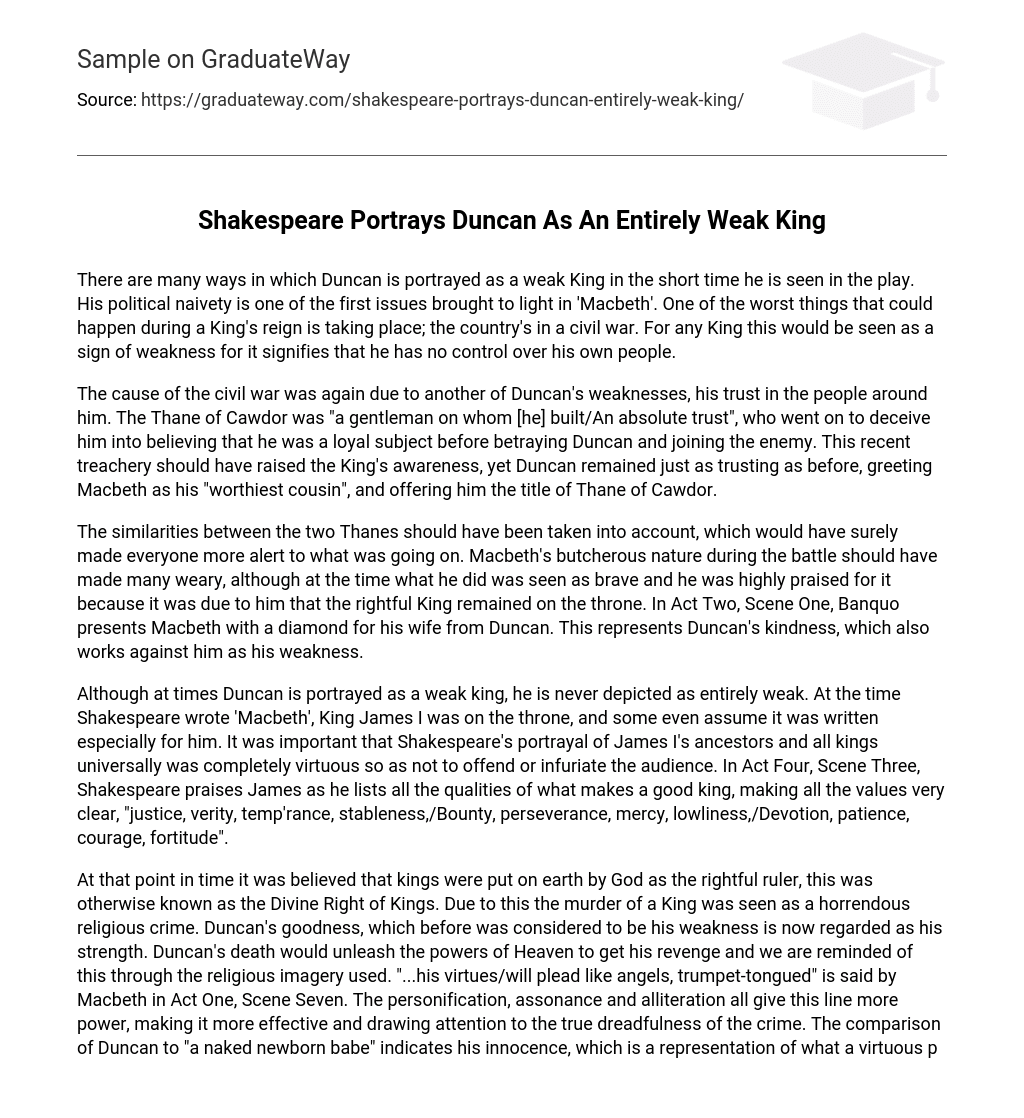There are many ways in which Duncan is portrayed as a weak King in the short time he is seen in the play. His political naivety is one of the first issues brought to light in ‘Macbeth’. One of the worst things that could happen during a King’s reign is taking place; the country’s in a civil war. For any King this would be seen as a sign of weakness for it signifies that he has no control over his own people.
The cause of the civil war was again due to another of Duncan’s weaknesses, his trust in the people around him. The Thane of Cawdor was “a gentleman on whom [he] built/An absolute trust”, who went on to deceive him into believing that he was a loyal subject before betraying Duncan and joining the enemy. This recent treachery should have raised the King’s awareness, yet Duncan remained just as trusting as before, greeting Macbeth as his “worthiest cousin”, and offering him the title of Thane of Cawdor.
The similarities between the two Thanes should have been taken into account, which would have surely made everyone more alert to what was going on. Macbeth’s butcherous nature during the battle should have made many weary, although at the time what he did was seen as brave and he was highly praised for it because it was due to him that the rightful King remained on the throne. In Act Two, Scene One, Banquo presents Macbeth with a diamond for his wife from Duncan. This represents Duncan’s kindness, which also works against him as his weakness.
Although at times Duncan is portrayed as a weak king, he is never depicted as entirely weak. At the time Shakespeare wrote ‘Macbeth’, King James I was on the throne, and some even assume it was written especially for him. It was important that Shakespeare’s portrayal of James I’s ancestors and all kings universally was completely virtuous so as not to offend or infuriate the audience. In Act Four, Scene Three, Shakespeare praises James as he lists all the qualities of what makes a good king, making all the values very clear, “justice, verity, temp’rance, stableness,/Bounty, perseverance, mercy, lowliness,/Devotion, patience, courage, fortitude”.
At that point in time it was believed that kings were put on earth by God as the rightful ruler, this was otherwise known as the Divine Right of Kings. Due to this the murder of a King was seen as a horrendous religious crime. Duncan’s goodness, which before was considered to be his weakness is now regarded as his strength. Duncan’s death would unleash the powers of Heaven to get his revenge and we are reminded of this through the religious imagery used. “…his virtues/will plead like angels, trumpet-tongued” is said by Macbeth in Act One, Scene Seven. The personification, assonance and alliteration all give this line more power, making it more effective and drawing attention to the true dreadfulness of the crime. The comparison of Duncan to “a naked newborn babe” indicates his innocence, which is a representation of what a virtuous person he is.
Duncan’s death resulted in complete chaos throughout the land. A complete inversion of nature began to take place. The darkness “strangles the daylight, a falcon was “hawked at” by a mousing owl, which would normally have been its prey, and Duncan’s horses that were “the minions of their race/Turned wild in nature, broke their stalls, flung out” and were unusually disobedient, as if they were making “war with mankind”. If Duncan had truly been entirely weak then his death would not have had such a huge effect on a force as great as nature. It is almost as if the murder of Duncan has poisoned nature into behaving so abnormally.
Even once Duncan has been murdered Macduff, who always was, and continues to remain honorable, patriotic and loyal to the rightful King. He is never completely persuaded of Macbeth’s innocence and does not believe that he deserves the respectable title of King. After discovering Duncan’s body Macduff will not co-operate with Macbeth. He avoids the coronation at Scone, instead going to “Fife”, due to his lack of trust in Macbeth and refuses to be a part of his court. Macduff’s loyalty is tested by Malcolm in Act Four, Scene Three. Malcolm portrays himself as unworthy of the title of King and acts as if he is more evil then even Macbeth.
When Macduff replies to this with “Fit to govern?/No, not to live” he earns the trust of the rightful heir to the throne. Macduff is not the only one to remain loyal to Duncan; other examples are Banquo, Donalbain and obviously Malcolm. If Duncan had been so weak his followers would not have remained faithful to him after his death. Another sign of Duncan’s strength is his triumph in the civil war, as Ross states in Act One, Scene Two, “The victory fell on us -“. If he had been entirely weak the war would not have resulted in his success.
Finally the death of Macbeth at the end of the play is evidence enough that good has triumphed over evil, which symbolizes Duncan’s victory even though he’s dead. Although Duncan has his weaknesses his strengths were constantly out ruling them while he was still alive and ultimately overcoming them after he had been murdered.
Looking back at the evidence at hand I have reached the conclusion that throughout ‘Macbeth’ Shakespeare never once portrays Duncan as an entirely weak king.





